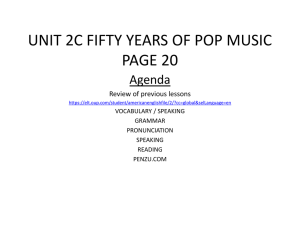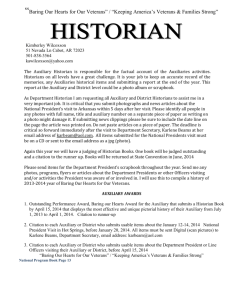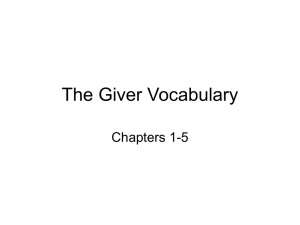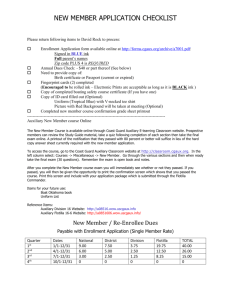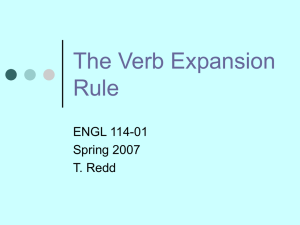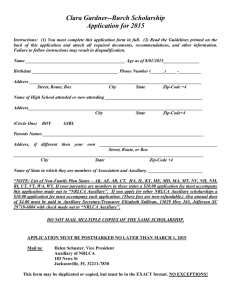SECOND course Spain
advertisement
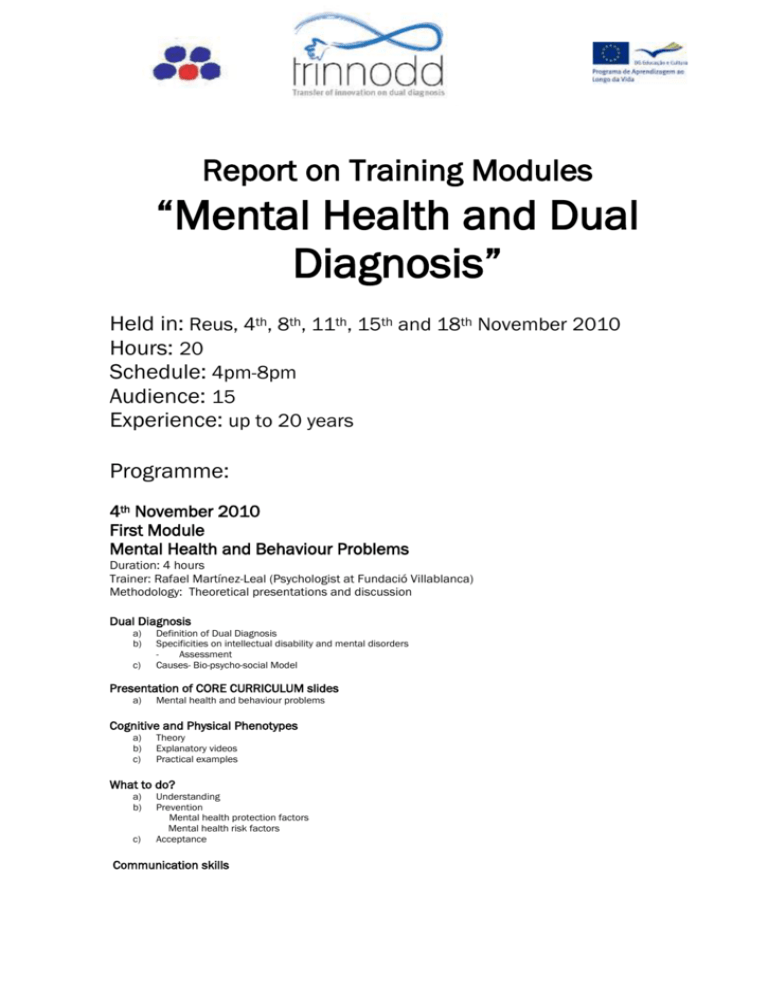
Report on Training Modules “Mental Health and Dual Diagnosis” Held in: Reus, 4th, 8th, 11th, 15th and 18th November 2010 Hours: 20 Schedule: 4pm-8pm Audience: 15 Experience: up to 20 years Programme: 4th November 2010 First Module Mental Health and Behaviour Problems Duration: 4 hours Trainer: Rafael Martínez-Leal (Psychologist at Fundació Villablanca) Methodology: Theoretical presentations and discussion Dual Diagnosis a) b) c) Definition of Dual Diagnosis Specificities on intellectual disability and mental disorders Assessment Causes- Bio-psycho-social Model Presentation of CORE CURRICULUM slides a) Mental health and behaviour problems Cognitive and Physical Phenotypes a) b) c) Theory Explanatory videos Practical examples What to do? a) b) c) Understanding Prevention Mental health protection factors Mental health risk factors Acceptance Communication skills 8th November 2010 Second Module Mental health (multidisciplinary teams) Duration: 4 hours Trainer: Mar Maduell (Psychologist at Fundació Villablanca) Methodologies: Theory, dynamics (Role –playing,) work in small groups and discussion Psychopathology a) b) Main concepts Mental disorders classification-explanation Presentation of CORE CURRICULUM slides a) b) Assessment Intervention Multidisciplinary teams a) b) c) d) Evaluation and diagnosis Case discussion Intervention planning –Pharmacology Evaluation of results Dynamics a) b) Role-playing: Front Line staff and Service Provide role in the Mental Health Promotion Discussion 11th November 2010 Third Module Vulnerability Duration: 4 hours Trainer: Eloisa Avellán (Social Worker at Fundació Villablanca) Methodologies: theoretical presentations, discussion of case studies, work in small groups Theoretical concepts Personal characteristics a) Bio-psycho-social model Presentation of CORE CURRICULUM slides b) Vulnerability and resilience 15th November 2010 Fourth Module Quality of Life Duration: 4 hours Trainer: Neus Cardias (Social worker at Fundació Villablanca) Methodology: Theory and discussion Personal and professional description a) Workplace- environmental and job description b) Social Interactions c) Hobbies-interests Presentation of CORE a) Quality of life Dynamics a) Case discussion 18th November 2010 Fourth Module Stress Management Duration: 4 hours Trainer: Daniel Gallo (Psychologist at Fundació Villablanca) Methodologies: Theory, dynamics and discussion Definition of Stress a) Bio-psycho-social model b) Trainees’ stress evaluation- RYFF SCALE c) Ryff 6 factor model d) Eustress vs Distress e) Stress response system Presentation of CORE CURRICULUM slides a) Stress Management Stress in the workplace a) Burnout Syndrome b) Problem Solving techniques c) Emotion expression Dynamics a) Role-Playing b) Laughter therapy c) Case studies CURRICULUM slides Trainees: CENTRE Centre PARTICIPANT CODE Subject GENDER: 1=Female, 2=Male Sex AGE Age F.VILLABLANCA 1 52 1 F.VILLABLANCA F.VILLABLANCA F.VILLABLANCA 2 3 4 45 48 42 1 2 1 F.VILLABLANCA F.VILLABLANCA F.VILLABLANCA 5 6 7 39 43 28 1 1 1 F.VILLABLANCA 8 23 1 F.VILLABLANCA F.VILLABLANCA F.VILLABLANCA F.VILLABLANCA F.VILLABLANCA F.VILLABLANCA F.VILLABLANCA 9 10 11 12 13 14 15 Mean 29 56 48 42 43 30 45 40,867 2 1 1 1 2 1 1 YEARS OF EXPERIENCE Experience PROFESSION (in words) Role AUXILIARY CARE GIVEREDUCATION AUXILIARY CARE GIVEREDUCATION AUXILIARY CARE GIVER AUXILIARY CARE GIVER AUXILIARY CARE GIVEREDUCATION AUXILIARY CARE GIVER AUXILIARY CARE GIVER AUXILIARY CARE GIVEREDUCATION AUXILIARY CARE GIVEREDUCATION AUXILIARY CARE GIVER AUXILIARY CARE GIVER AUXILIARY CARE GIVER AUXILIARY CARE GIVER AUXILIARY CARE GIVER AUXILIARY CARE GIVER WORKPLACE (indicate how many clients/users, in numbers) Workplace LEVEL OF COURSE ATTENDANCE: 1=low, 2=medium, 3=high Attendance F.VILLABLANCA 1 F.VILLABLANCA F.VILLABLANCA F.VILLABLANCA 3 3 3 F.VILLABLANCA F.VILLABLANCA F.VILLABLANCA 3 3 3 F.VILLABLANCA 3 F.VILLABLANCA F.VILLABLANCA F.VILLABLANCA F.VILLABLANCA F.VILLABLANCA F.VILLABLANCA F.VILLABLANCA 3 3 3 3 3 3 3 The group was integrated by 15 auxiliary care givers 5 with educational experience, 12 women and 3 men all of them working in different units at Fundació Villablanca. Despite no official registers for the training, experience vary from 1 to up to 20 years Evaluation: All trainees have filled in the evaluation form 1 before starting the training and form 2 after the training, so 15 forms have been collected.
